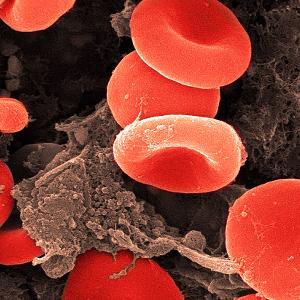Blood clot blockers
4 Nov 2021
LMU medical specialists led by Christian Weber propose treatment for rare, life-threatening complication from Astra-Zeneca vaccine.
4 Nov 2021
LMU medical specialists led by Christian Weber propose treatment for rare, life-threatening complication from Astra-Zeneca vaccine.

Electron micrograph of red blood cells and fibrin. | © Imago
Certain drugs used in cancer therapy, known as BTK inhibitors, are able to normalize the pathological activation of platelets with associated blood clot formation which occurs in rare cases after vaccination with the Astra-Zeneca COVID-19 vaccine. This is reported by a team of physicians working with Professor Christian Weber at the University of Munich Hospital in the latest issue of the New England Journal of Medicine. Weber, the Director of the LMU’s Institute for Prophylaxis and Epidemiology of Circulatory Diseases, calls the development “an urgently needed way of treating this worrying vaccine complication.” Germany has seen well over twelve and a half million doses of Astra-Zeneca’s Vaxrevia vaccine administered so far, and over 67 million doses have been given EU-wide. The severe side effect known as VITT (vaccine-induced immune thrombotic thrombocytopenia) that has been the subject of much attention occurs in about one to one and a half out of 100,000 vaccinations, “so it is a rare but life-threatening side effect with high mortality,” says Weber. Moreover, many more doses of the Astra-Zeneca vaccine have been and are being donated to countries in need around the world, making VITT a global problem.
In a laboratory model, the medical experts had blood serum from VITT patients available. When they added the serum to blood from healthy subjects, they observed the activation of platelets and the subsequent formation of blood clots. However, when a BTK inhibitor had been added to the subjects’ blood samples, “the formation of blood clots did not occur,” says Priv.-Doz. Dr. Philipp von Hundelshausen, a visiting lecturer who was involved in the study. The drug blocks an enzyme that is essential for blood clot formation.
One BTK blocker has already been approved for cancer treatment, while others are currently in the clinical trial stage. In order for the drugs to be used against VITT, “they would need to be tested in clinical trials as well,” explains Weber. The BTK inhibitors might also help in the treatment of two other diseases that arise through the same mechanisms as VITT. One is when some people who suffer from an autoimmune disease suddenly experience blood clots when heparin is administered as part of the treatment. And then in rare cases, some patients develop blood clots even without the administration of heparin.